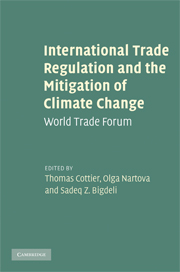Book contents
- Frontmatter
- Contents
- Contributors
- List of figures
- List of tables
- List of abbreviations
- Preface
- PART I Climate change mitigation: scientific, political and international and trade law perspectives
- PART II Climate change mitigation and trade in goods
- 5 How to think about PPMs (and climate change)
- 6 Tilting at conventional WTO wisdom
- 7 Private climate change standards and labelling schemes under the WTO Agreement on Technical Barriers to Trade
- PART III Trade in renewable energy sources
- PART IV Climate change mitigation and trade in services
- PART V Climate change and technology transfer, investment and government procurement: legal issues
- PART VI Institutional challenges and the way forward
- Index
7 - Private climate change standards and labelling schemes under the WTO Agreement on Technical Barriers to Trade
from PART II - Climate change mitigation and trade in goods
Published online by Cambridge University Press: 04 August 2010
- Frontmatter
- Contents
- Contributors
- List of figures
- List of tables
- List of abbreviations
- Preface
- PART I Climate change mitigation: scientific, political and international and trade law perspectives
- PART II Climate change mitigation and trade in goods
- 5 How to think about PPMs (and climate change)
- 6 Tilting at conventional WTO wisdom
- 7 Private climate change standards and labelling schemes under the WTO Agreement on Technical Barriers to Trade
- PART III Trade in renewable energy sources
- PART IV Climate change mitigation and trade in services
- PART V Climate change and technology transfer, investment and government procurement: legal issues
- PART VI Institutional challenges and the way forward
- Index
Summary
Introduction
Private carbon and climate change labelling schemes allow consumers to make choices based on carbon emissions over the whole or a part of a product's life cycle. Carbon labels raise consumer awareness and may increase pressure on producers and companies to reduce carbon emissions. Private climate change labelling schemes are proliferating rapidly. Labels reflecting ‘air miles’ and ‘food miles’ are now part of the marketing strategy of two UK supermarkets — Marks & Spencer and Tesco. Other private standardisation and labelling organisations, including the Soil Association and Bio Suisse, are examining or have already decided (respectively) to deny organic certification for products transported by airfreight — a carbon-intensive form of transport. This paper first discusses the policy implications of private climate change labelling schemes, then scrutinises their legality under the WTO Agreement on Technical Barriers to Trade (TBT).
Policy perspective
Climate change standards and climate labelling: the policy dimension
Private labelling schemes are not generally based on agreed international standards. As a result, they may risk confusing consumers. The potential for consumer confusion is compounded by the fact that private labels often focus on one narrow aspect of a product's life cycle (such as transport), which may present an incorrect view of that product's overall implications for climate change, and could undermine confidence in more sophisticated carbon and climate change labelling schemes. Certain problems posed by private schemes are discussed below.
- Type
- Chapter
- Information
- International Trade Regulation and the Mitigation of Climate ChangeWorld Trade Forum, pp. 131 - 152Publisher: Cambridge University PressPrint publication year: 2009
- 4
- Cited by

